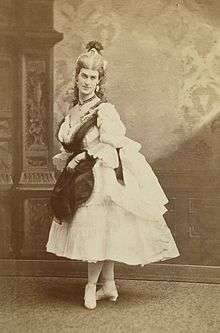Francis Leon

Francis Leon (born Francis Patrick Glassey;[1] 21 Nov 1844 – after 1883) was a blackface minstrel performer best known for his work as a female impersonator.[2] He was largely responsible for making the prima donna a fixture of blackface minstrelsy.
Leon was trained as a boy soprano by Rev. Dr. Cummings in Fordham, NY. He performed the first soprano part in Mozart's Twelfth Mass at St. Stephen's church in New York City at age 8. Leon entered minstrelsy in 1858. Only 14 at the time, he quickly rose to fame by specializing in portraying female prima donna characters, mulatto coquettes in yellow makeup and elaborate costumes. Leon's 300 dresses (which he refused to call "costumes") were a key piece of his act, and some cost as much as $400.[3] He came to refer to himself as simply "Leon" or "The Only Leon". His influence was such that by 1873, every major minstrel troupe had its own Leon imitator. In 1882, he earned more than any other minstrel performer.[4]
The press loved him. In 1870, The Clipper raved, "Leon is the best male female actor known to the stage. He does it with such dignity, modesty, and refinement that it is truly art."[5] In fact, Leon's impersonation was so convincing that a reviewer in Rochester, New York remarked, "Heaps of boys in my locality don't believe yet it's a man in spite of my saying it was", and that Leon could "make a fool of a man if he wasn't sure."[5] Another critic raved, "He is more womanly in his by-play and mannerisms than the most charming female imaginable."[5] The idea that a male performer represented women better than women was echoed by another critic who noted, "Just as a white man makes the best stage Negro, so a man gives more photographic interpretation of femininity than the average woman is able to give".[6]
In 1864, Leon formed a minstrel troupe with Edwin Kelly. Leon and Kelly's Minstrels spoke of their freedom from vulgarity and featured elaborate scenery and refined operas with Leon as the female lead. Though these were at heart burlesques, Leon insisted that everything was quite proper. He claimed to have studied ballet from a respected dancer and to have practiced for "hours every day" for seven years. He further asserted that he took voice lessons from famous opera teacher Errani.[3] Ultimately, however, Leon's performances were not enough to keep the company afloat. By 1883, Leon had joined the San Francisco Minstrels.
Gallery
Notes
- ↑ Senelick, Laurence (2000). The Changing Room: Sex, Drag and Theatre (1st ed.). London: Routledge. p. 277. ISBN 0-415-10078-X.
- ↑ Bordman, Gerald Martin; Hischak, Thomas S. (2004), The Oxford Companion to American Theatre, Oxford University Press, p. 221, ISBN 0-19-516986-7
- 1 2 Toll 144.
- ↑ Toll 142.
- 1 2 3 New York Clipper. Quoted in Toll 142.
- ↑ Slide, Anthony. The Encyclopedia of Vaudeville. University Press of Mississippi, 2012: 172. ISBN 978-1-61703-249-3
References
| Wikimedia Commons has media related to Francis Leon. |
- Toll, Robert C. (1974). Blacking Up: The Minstrel Show in Nineteenth-century America. New York: Oxford University Press.


